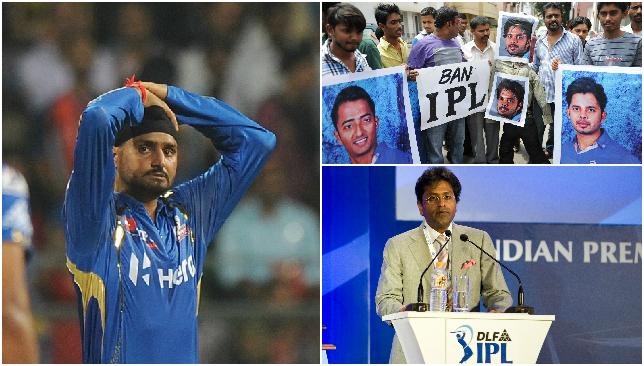
Ahead of the star-studded tournament on April 8, defending champions Kolkata Knight Riders threatened to withdraw from the Indian Premier League if the BCCI did not clear mystery spinner Sunil Narine and were willing to take Indian cricket’s governing body to court if the bowler was suspended. Despite ICC’s clearance the BCCI insisted that the West Indian underwent further tests in order to participate in IPL 8.
Since its inception in 2008, the IPL has been rocked by many infamous controversies both on and off the field. Players and officials have been banned for their involvement in match fixing, team owners have been suspended for illegal betting and BCCI board members have been accused of manipulating the competition to their own financial and commercial gain.
All this should result in a tarnished product but the league remains the biggest of its kind in world cricket and still attracts the best players in the world for huge sums of rupees.
Match fixing and betting
The sixth edition in 2013 was by far the most controversial season in IPL history. Delhi Police arrested Sree Sreesanth, Ankeet Chavan and Ajit Chandila of the Rajasthan Royals on charges of spot-fixing and 11 bookies, one which, Amit Singh, a former Rajasthan player. The BCCI immediately handed those involved life bans from the sport. Rajasthan Royals owner Raj Kundra was questioned by Delhi police over the allegations, and after a long enquiry confessed to have bet on IPL matches, including those that involved his own team.
Further investigations revealed a number of high profile involvements in the betting scandal as Bollywood actor Vindoo Dara Singh and Chennai Super Kings co-owner and son-in-law of then-BCCI chief N Srinivasan, Gurunath Meiyappan, were both arrested. CSK distanced themselves from the claims, insisting that both were simply ‘cricket enthusiasts’. As a result, Srinivasan was forced to temporarily step aside as BCCI President and his hopes to take over the ICC chairmanship were thrown into doubt.
After the fallout, CSK and India skipper MS Dhoni filed a Rs 100-crore defamation case in the Madras High Court against media houses Zee Media Corporation and News Nation Network for linking him with illegal activities of betting, match-fixing and spot-fixing. Dhoni was never found guilty or charged with any offences.
Lalit Modi suspension
IPL’s first commissioner and chairman was suspended after the BCCI found him guilty of misappropriation of funds related to the second edition of the league held in South Africa. Modi reportedly had stakes in 3 different franchises and continuous acts of misconduct led to his sacking as IPL chief. Modi also announced ownership details of the now-defunct Kochi Kerala Tuskers franchise on Twitter in breach of confidentiality agreements.
With one tweet Lalit Modi has managed to get Tharoor sacked ,the Kochi IPL team board to resign & Sunanda to give up her stake.
— $ir $ri $ri Magal (@jhunjhunwala) April 18, 2010
During the same season, Kings XI Punjab co-owners Ness Wadia and Mohit Burman were allegedly beaten up by police and guards for misbehaving with a lady spectator, who happened to be the daughter of influential South African industrialist Ajay Gupta.
IPL 2012
This edition was hit with the highest number of controversies. First, RCB’s Australia batsman Luke Pomersbach was arrested for molesting a woman and threatening her fiancé. The matter was later settled out of court.
Pune players Rahul Sharma and Wayne Parnell were caught red-handed at a Mumbai rave and later tested positive for illegal substances following an investigation.
Mumbai rave party: IPL players Wayne Parnell, Rahul Sharma detained – NewsX http://t.co/bWWFCIYelK
— SATYA (@satya_kolkata) May 16, 2013
That year saw the end of the Deccan Chargers after the franchise failed to pay its franchise fee to the BCCI. Adding salt to the wound of their demise, Deccan pacer TP Sudhindra was given a life ban after agreeing to spot-fix matches in a sting operation organized by a TV channel. Veteran Uttar Pradesh pacer Shalabh Srivastava was handed a five-year ban after also being caught agreeing to fix matches.
Slapgate
In one of the ugliest scenes on an IPL pitch (and there have been a few!), Mumbai Indians’ former skipper Harbhajan Singh slapped Kings XI Punjab’s Sreesanth after losing a tense match during the inaugural season. The speedster was seen sobbing and after a thorough BCCI investigation Harbhajan’s season was brought to a premature end with an 11-game ban. Although the video footage was never released, Shreesanth later claimed that Harbhajan had not slapped but ‘elbowed’ him.
Despite the ugliness of the IPL it has brought massive financial value to Indian cricket and the BCCI through global TV deals, franchise fees and merchandising. With millions of dollars on offer and the backing of former cricketing greats, the league will flourish in a cricket-crazy nation such as India for many years to come. For the BCCI it seems that the only thing that cannot be bought when it comes to the IPL is the integrity of the game itself.